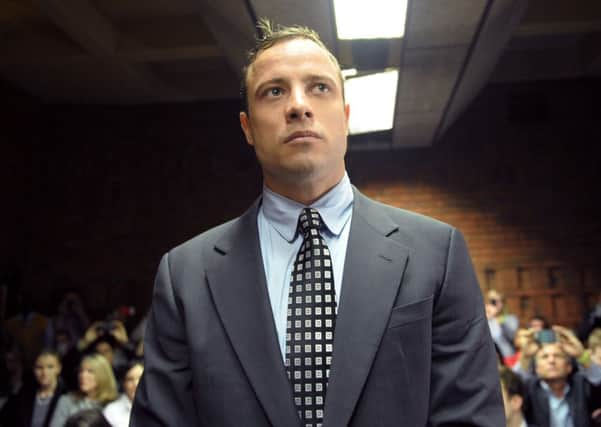South Africa: Pistorius trial set to begin


June Steenkamp, whose daughter, Reeva, was the South African Olympic athlete’s girlfriend when he shot her through a locked bathroom door last February, said she could find it in her heart to forgive him but only once he understood the pain he had caused her.
The South African justice system will be under global scrutiny when the trial starts today at North Gauteng high court in Pretoria. The nation’s justice system is experimenting during the trial with live television and radio broadcasts of the court proceedings, which will only serve to heighten interest in the case.
Advertisement
Hide AdAdvertisement
Hide AdIn an interview on the eve of proceedings, Ms Steenkamp said: “I want to look at Oscar, really look him in the eyes, and see for myself the truth about what he did to Reeva. And whatever the court decides at the end of the trial, I will be ready to forgive him, but first I want to force him to look at me, Reeva’s mother, and see the pain and anguish he had inflicted on me. I feel I need that.”
She added: “I know many people in my position would want to see him dead or badly punished. But I believe in faith and justice and I don’t have any hatred or revenge in my heart. I would rather pray for him and pray that my family can get through this terrible time.”
Comparisons are already being made to the trial of OJ Simpson, which became a global media circus in 1994. The case in South Africa will be scrutinised by international newspapers, media and even a dedicated 24-hour TV channel devoted to the coverage in South Africa. Unlike most democracies, South Africa no longer has trial by jury as the jury system was abolished in 1969 following arguments that whites-only juries during apartheid would be unlikely to deliver fair verdicts involving, for example, a white perpetrator and a black victim.
Instead the trial judge, Thokozile Masipa, will decide the verdict in the Pistorius case, with the assistance of two assessors.
Parts of the Oscar Pistorius’ murder trial can be broadcast live on television by three remote-controlled cameras in court, but testimony given by Pistorius cannot be shown. Judge Dunstan Mlambo, who made the decision to allow broadcasting, said he had weighed up arguments for a fair trial from the Pistorius camp with principles of open justice and freedom of expression.
The prosecution has 107 witnesses lined up for the trial, including Pistorius’s ex-girlfriends Melissa Rom and Samantha Taylor. Erin Stear, who has denied reports she had an affair with Pistorius, will also take the witness stand. The court will also hear from the former footballer Mark Batchelor who has claimed that the athlete threatened to “break my legs” because of his friendship with Reeva.
Pistorius admits shooting dead Reeva Steenkamp, a model, on 14 February last year but claims that when he fired through the closed bathroom door he believed he was shooting at a burglar. The prosecutors are expected to build up a picture of Pistorius as an angry, jealous hothead with a passion for guns and little self-control. The court will be told that, in the past, Pistorius accidentally fired a pistol under a restaurant table in Johannesburg.
Marius du Toit, a former prosecutor, magistrate and now criminal defence lawyer in South Africa said that the prosecutors have an edge. He said: “Any person that has admitted to killing another person in circumstances when your actions are unlawful will face a steep hurdle in getting off scot-free.” South Africa has stringent laws regulating the use of lethal force for self-protection. In order to get a permit to own a firearm, applicants must not only know those rules but must demonstrate proficiency with the weapon and knowledge of its safe handling, making it far tougher to legally own a gun in South Africa than many other countries where a mere background check suffices.